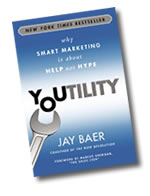Creating business value increasingly equals creating customer value. Customer-centricity isn’t a goal anymore, it’s the basis. And usefulness is key to achieve it: remember the crucial role of the customer’s voice and of intent in a connected customer experience approach. Jay Baer wrote a book about the need to be useful – Youtility – and provides a framework. An overview and interview.
Helping is the new ‘selling’ author Jay Baer says. Helping customers to find answers to their questions or enable them to fulfill a task by being utterly useful and customer-centric. Today, this notion is more than ever a connected and social one: being useful to the customers of your customers (or should we say audiences?) is what marketing and business are increasingly about. Creating customer value: value for the customer in the broadest sense. In this interview, Youtility author Jay Baer shares his views.
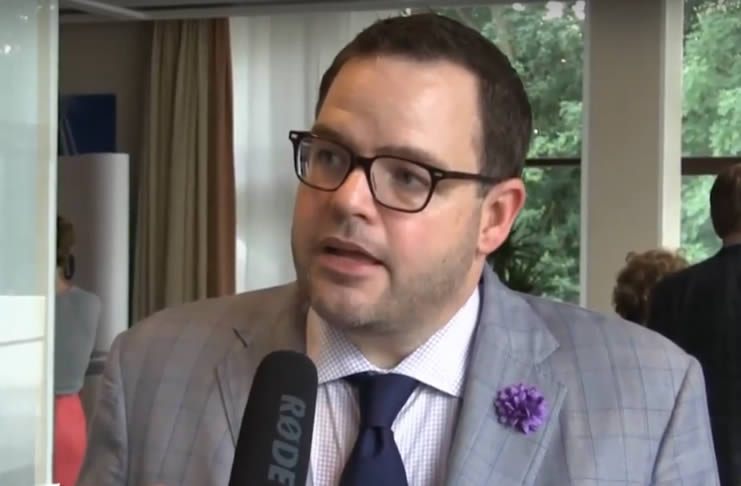
Note: Jay Baer was a speaker at i-SCOOP’s content marketing conference Europe 2014.
The best content marketing transcends the transactional and focuses on improving the lives of customers, not just pushing product (Jay Baer)
In Youtility, you build a connection between service in the broadest sense (being helpful, being at service) and marketing. Marketing has to begin with offering value and delivering upon promises. How do you see that from a practical framework and organizational approach? Because you urge people to look at it as a process, right?
Jay Baer: Indeed. Instead of looking at marketing solely as something the company needs that must cover all the product feature and benefit bases, the Youtility framework suggests that you first uncover broader customer/prospect needs, and then develop and measure executions against those needs.
Customer experiences are shaped by global experiences
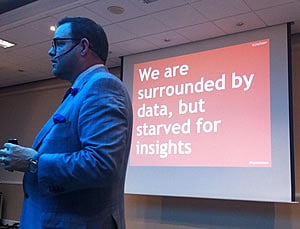
On your website you always emphasized your hype-free approach. You clearly put that in the book. Usefulness before more hollow terms such as ‘being remarkable’ or ‘amazing’. Part of that hype-free approach is also making usefulness measurable and tangible. What should people remember in that regard?
Jay Baer: This will sound silly, but it’s true. If you want to measure the impact of Youtility (or any other marketing approach) you need to do something measurable.
You must find a way to have visibility at the transaction layer, and then work backwards up the funnel. In that way, B2B has an easier time of it, since it typically has that transaction visibility in ways that B2C sometimes does not.
An interesting point I noticed is the part where you rightfully say that customer experiences – the holy grail – are shaped by global experiences instead of experiences customers have in just the industries marketers are active in. It’s a holistic view looking at people as a whole and not as isolated pieces. Can you give an example of how global customer experiences can come into play in a specific industry?
If you sell something, you make a customer today. If you help someone, you make a customer for life (Jay Baer)
Jay Baer: It’s remarkable how often I hear marketers say things like “well, nobody in OUR industry is doing that,” or “That case study doesn’t apply in our industry.” Consumers of all types are manifestly impacted by best practices, regardless of where and how they are unfurled. Zappos’ commitment to customer service changes the expectation level for all.
We never really talked, mailed or met before but something tells me that you’re a customer-centric and integrated marketing thinker that now and then feels the urge to call the BS in marketing. Between us (well, not really): what are the popular kind of messages you see shared nowadays in general whereby you have to keep your cool? Where do marketers and ‘thought leaders’ miss the ball in a more integrated approach?
Jay Baer: I have the urge. Oh, I have the urge. But I was raised that “if you don’t have anything nice to say, keep your mouth shut.”
Thus, I don’t often take the stuffing out of people or trends. Just not my style. But, as you allude to above, I am exceedingly annoyed by the advice of many consultants and authors, who encourage companies to succeed by “being amazing” – as if reaching that standard was simply a matter of desire. Ridiculous. I am also irked by over-emphasis on social media. Some people will tell you social media is some kind of unicorn, but maybe it’s just a horse?
Customer centrism and usefulness requires playing the long game and attempting to achieve unprecedented relevancy (Jay Baer)
Youtility is not just an idea but an imperative
When I wrote a brief piece mentioning your book, our mutual connection Chuck Kent, who created one of his – by now – famous songs at the occasion of the book, was quick to warn me that Youtility is not a content marketing book. It’s about service, integration, digital, social and more too. However, what are some key lessons regarding content marketing for you?
Jay Baer: Chuck is a great friend, and has been on board with the larger Youtility trend since day one. While I very much believe Youtility has broad applicability outside marketing, and will be talking more about that down the road, I specifically wrote the book for two reasons.
First, as a reaction to the culture of “be amazing” which, as mentioned above, is a seductive, yet terrible, framework. Second, to give companies a strategic scaffolding for content marketing.
Many/most companies are on the content bandwagon now, but they often lack a rationale for creating content, and an understanding of how it fits into the larger marketing scheme. Youtility is intended to be that scaffolding. As Gary Vaynerchuk has said, the problem with marketing today is that everyone wants to be a hunter, and nobody wants to be a farmer. Youtility is the how-to guide for farming as a marketer.
A few years ago, Joseph Jaffe, published his ‘customer service manifesto‘ but the message seems to have been lost a bit in recent years. I see several reasons such as the recession and the success of more recent ways of looking at marketing whereby you always have that hype stage and focus on channels and tactics. Joe Pulizzi talks about the importance of the WHY, you focus on the WHO and WHY in a sense too, our friend Lee Odden connects the dots in Optimize as well. It seems that the customer (experience) and service in general start getting their place again, along with a more holistic approach. Why do you think that message gets louder now? And why do you think that businesses and marketers keep making the same mistakes each time the next ‘big thing’ comes around? How can Youtility help them from not repeating those same mistakes in the future?
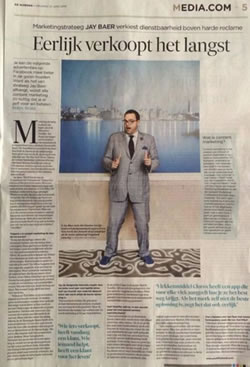
Jay Baer: I couldn’t agree more. Joseph’s book Flip the Funnel is an outstanding read that doesn’t get enough attention (note: I can only confirm that, the book deserves to be rediscovered and @jaffejuice knows how to tell the story on stage) and Joe and Lee are doing important work, too.
Joe’s new book is a smash. The reason it’s taken a while for companies to get their heads around this “help not hype” approach (as I put it in Youtility) is that it flies in the face of what marketers have been taught, and how marketing has been rewarded and compensated.
Customer centrism and usefulness requires playing the long game, and attempting to achieve unprecedented relevancy. Now, however, larger shifts in consumer behavior in the areas of mobility and information access have made Youtility not just a good idea, but an imperative. And companies are starting to embrace it in a big way. We’re having lots of conversations with major brands about how to embed Youtility into their marketing approach. It’s an exciting time.
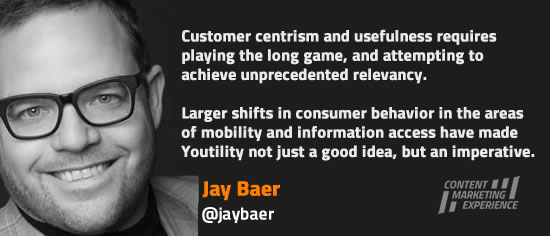
You had a very smart approach in the creative and marketing process regarding the book as such. You also openly shared it, a way of wanting to be useful and help others I imagine. You focus a lot on creating a culture of usefulness though and make Youtility more than just a process or tactic. Where does the average manager start when he wants to make his company more ‘youtile’ in practice?
Customer value and the ultimate FAQ
Jay Baer: The very best place to start is with the “ultimate FAQ.”
Talk to sales, operations, customer service and document all the questions (or the top 100, at least) that customers/prospects ask about the company. Methodically answer each with at least one freestanding piece of content (typically, a blog). Once you have that low hanging fruit harvested, you can move on to more indirect forms of Youtility creation.
I wonder how you look at concepts such as thought leadership and influence in a context of Youtility?
Jay Baer: I don’t abhor thought leadership as a concept. After all, developing thought leadership is how I was able to get a deal to write the book.
But thought leadership builds value for the influencer and her company. It doesn’t build any value for the consumer. Consequently, I’d prefer organizations look at Youtility and thought leadership as parallel approaches. Be useful on one hand, and then develop influence as a way to drive awareness of those useful things. I see thought leadership as a top of the funnel mechanism, in general.
Smart marketers give themselves permission to make the story bigger (Jay Baer)
If you would have to summarize Youtility in just 4 tweets, what would they be?
Jay Baer:
- If you sell something, you make a customer today. If you help someone, you make a customer for life.
- Today, relationships are more often created with information, not with people. You must over-communicate everything.
- Smart marketers give themselves permission to make the story bigger.
- Content is fire. Social media is gasoline.
I’m summing up a few words. Can you make a sentence using each one with the first thing that comes to mind per word?
- Content. Jay: Content is fire. Social media is gasoline.
- ROI. Jay: True ROI calculation is possible, but only if you figure out the tracking narrative before you get started.
- Relevance. Jay: Today, when consumers have all the power in the messaging equation, without relevancy you have nothing.
- Social media. Jay: Use social media to promote Youtility first, your company second.
- Content marketing. Jay: The best content marketing transcends the transactional and focuses on improving the lives of customers, not just pushing product.
- Human. Jay: We too often lose the human element today, when thinking about marketing (especially digital). We are awash in data, but starved of insight.
- BS. Jay: It’s easier than ever to sling b.s, but fortunately also easier than ever to uncover it.
- Jay Baer. Jay: Whether it’s in the board room or on the stage, Jay Baer wants to help companies become more useful.
What would your friends and family say if I ask them to describe Jay Baer as a person in a few words. And don’t answer I should ask them, you must have an idea ;)
Jay Baer: An organizer. A leader. Funny. A tequila guy. And hopefully, a Youtility.
Where can people hear you speak about Youtility? What other resources do you recommend to people?
Jay Baer: Many free resources on the official website for the book at www.youtilitybook.com including a juicy excerpt of the book itself. I’ll be all over North America this spring (and Webinars) talking Youtility. Full schedule is here.
The problem with marketing today is that everyone wants to be a hunter, and nobody wants to be a farmer (Jay Baer)
Customer-centric marketing: letting go of the fear
The main challenges to be you-tile as always is one of processes, people and mentality. And connecting the dots through the holes of the silos.
And not trying to implement the same old ways of ‘doing’ marketing – inspired by fear on channels and across touchpoints where it makes no sense at all (and then saying those channels don’t work). Context, connection, integration, footprints, data and action, focused on creating real customer value.
Fear is the dragon we have to keep fighting. Disconnected silos and short-term selfishness, especially when all mid-and long-term customer-centricity gets killed by it. Be useful when and why it matters in the journey. In fact, be useful anytime. But don’t be blind for the reality. Some stuff we declared dead works very well, it’s all a matter of balance and knowing thy customers.
Can you make your business a caring one and do you know how to be empathic and useful – in content marketing and beyond, even in your product marketing – without being just utilitarian about it and at the same time know when to get the business? Marketing so useful people would pay for it as Jay’s Youtility says?
Time to unleash the customer-centric and fearless dragon slayer that isn’t obsessed with control, sitting deep inside all of us.
PS: fearlessness is a myth, you just have to feel the fear, know it’s there and wonder if it isn’t easier to slay the dragons we often created ourselves than we…fear. We are all Chief Customer Officers and paid by customers in the end. Customer-centricity, through usefulness or any other act/mindset, is never wrong.
Jay Baer is a hype-free social media and content strategist & speaker, and author of Youtility: Why Smart Marketing is About Help not Hype. Jay is the founder of http://convinceandconvert.com and host of the Social Pros podcast.


